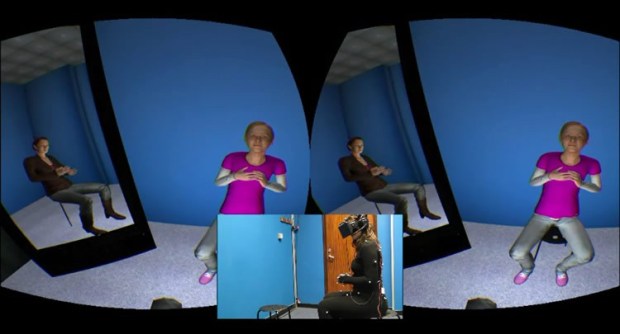
Participant playing the role of an adult comforting a crying child. Credit: UCL.
An immersive virtual reality therapy could help people with depression to be less critical and more compassionate towards themselves, reducing depressive symptoms, finds a new study from UCL and ICREA-University of Barcelona.
After just nine weeks of internet-delivered cognitive behavioral therapy, the brain of patients suffering from social anxiety disorder changes in volume. Anxiety is reduced, and parts of the patients’ brains decrease in both volume and activity. This study could help us develop more effective therapies for one of the most common problems in mental health.
New research shows brain function associated with attention peaks during the summer and dips in winter.
Pain can sear memories into the brain, a new study finds. A full year after viewing a picture of a random, neutral object, people could remember it better if they had been feeling painful heat when they first saw it.
New research reveals the cellular mechanisms by which memory-encoding neuronal networks emerge.
Why do we remember some events, places and things, but not others? Our brains prioritize rewarding memories over others, and reinforce them by replaying them when we are at rest, according to new research.
Researchers have found evidence to suggest a significant relationship between cannabis use and the onset and exacerbation of mania symptoms.
A study provides new insight into how the brains of drug addicts may be wired differently. The findings, which appear in the journal Psychopharmacology, show that while drug users have very strong motivation to seek out “rewards,” they exhibit an impaired ability to adjust their behavior and are less fulfilled once they have achieved what they desire. Addressing this disconnect between the craving for a drug and the ability to regulate behavior may be one of the keys to breaking the cycle of addiction.
Reading and listening to music at the same time affects how you hear the music. Language scientists and neuroscientists published this finding in an article in Royal Society Open Science.
Cognitive scientists have found more evidence that aging brains work differently than younger brains when performing the same memory task, pointing to a potentially new direction for age-related cognitive care and exploration.
Scientists have demonstrated for the first time that it is possible to specifically modify gene expression in diseased upper motor neurons, brain cells that break down in ALS.
Finally this week, researchers have discovered how cells in the human body build their own ‘railway networks’, throwing light on how diseases such as bowel cancer work. The results have just been published in Nature Scientific Reports.
I would agree with the New Findings of Cannabis Research–Margaret–Thanks for all the Latest Research.